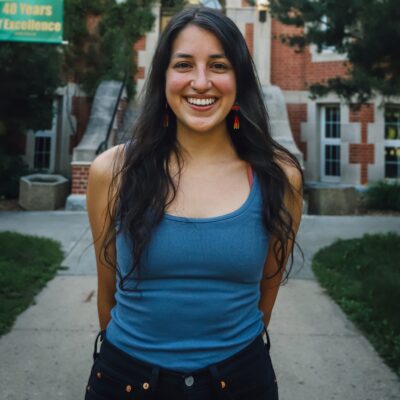Student Spotlight: Cheyenne Reuben-Thomas

December 11, 2023
Cheyenne I. Reuben-Thomas (Oneida/Seneca) is a doctoral student in ecology and evolutionary biology from the Oneida Nation of Wisconsin. She earned her B.A. in integrative biology from Buffalo State University; M.Sc. in ecology, evolution, genetics, and genomics from the University of Rochester; and now studies the effects of traditional ecological knowledge and settler colonialism on insect diversity under the guidance of Corrie Moreau at Cornell.
What is your area of research and why is it important?
I am broadly interested in comparing the effects of traditional ecological knowledge and settler colonialism on insect diversity. More specifically, I will investigate the effects of ‘good fire,’ or prescribed burning led by Indigenous fire practitioners, on species diversity and genetic variation of ants. Although insects fill an array of ecological roles which maintain a healthy ecosystem, they are largely overlooked in conservation contexts. More broadly, this research has the potential to emphasize the need for Indigenous-led conservation which considers all of our non-human relations.
What are the larger implications of this research?
It’s estimated that about 80% of the world’s biodiversity is present on lands that Indigenous peoples have strong connection to, which makes up for less than a quarter of the planet’s total land… That means we are doing something right! Investigating the effects of traditional ecological knowledge and practices on insect diversity may offer valuable insight when developing conservation strategies and land management practices. Including Indigenous voices in development will promote environmental justice by mitigating the alarming rate of biodiversity loss across the world.
What does it mean to you to be a Dean’s Scholar?
Being a Dean’s Scholar means that I am now part of a diverse community of scholars across many fields at Cornell. Because of this, I am able to connect with people who may have similar lived experiences, allowing me to feel more open and comfortable about my own journey through higher education. Academia was built to exclude the BIPOC community, so I am proud to share this space among the many brilliant minds who are actively changing the norms.
What are you most looking forward to in regard to being a Dean’s Scholar?
I am excited to connect with scholars from a myriad of identities, learning how they are putting these identities into their own work, and continue learning from them beyond academia. I look forward to making lifelong friendships and celebrating everyone’s accomplishments, big and small. As someone who is passionate about creating diverse spaces in academia, I am also looking forward to mentoring and uplifting future Dean’s Scholars.
President Pollack has designated this academic year’s theme as “freedom of expression.” What does freedom of expression mean to you?
For me, freedom of expression in academia means having the ability to explore my academic interests while challenging Western worldviews. As an Onʌyoteˀa•ká• (enrolled member of the Oneida Nation of Wisconsin) and Onöndowa:ga:’ (Tonawanda Band of Seneca) scholar, this idea is inherently important to me. This year’s theme will be apparent throughout my research as I highlight Indigenous ways of knowing in the fields of ecology and evolution and entomology, while simultaneously addressing how settler colonialism has impacted these fields.
What are your hobbies or interests outside of your research or scholarship?
Outside of my research, I enjoy backpacking or traveling to new countries with my spouse when I can find the time. I have hiked all 46 Adirondack High Peaks and much of the Appalachian and Pacific Crest Trails. Throughout the year, I also travel to powwows across the nation to smoke dance or fancy shawl dance with community. If I’m staying in (especially around this time of year), you can usually find me making cicada-wing earrings, working on a new beadwork project, or snuggling my cats by the fire!
Why did you choose Cornell to pursue your degree?
Beyond everything, I gravitated toward working with Dr. Corrie Moreau – it’s just a bonus that she brought me to Cornell! Other than her scholarship, I reached out because of the wonderful things I’ve heard about her advocacy efforts in diversity, equity, and inclusion as well as her support of graduate students. Dr. Moreau is someone that I aspire to emulate throughout my career, and her mentorship has already been quite impactful for me. She may be the reason I am here, but I am so happy to have also found a strong community on campus, including other Indigenous students (and a few faculty!) I am lucky enough to interact with and learn from.

